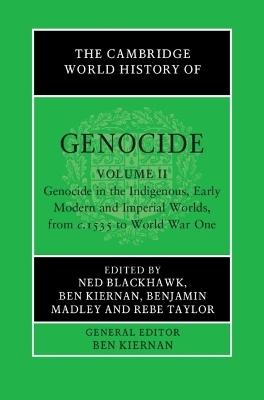
The Cambridge World History of Genocide: Volume 2, Genocide in the Indigenous, Early Modern and Imperial Worlds, from c.1535 to World War One
Cambridge University Press (Verlag)
978-1-108-48643-9 (ISBN)
Volume II documents and analyses genocide and extermination throughout the early modern and modern eras. It tracks their global expansion as European and Asian imperialisms, and Euroamerican settler colonialism, spread across the globe before the Great War, forging new frontiers and impacting Indigenous communities in Europe, Asia, North America, Africa, and Australia. Twenty-five historians with expertise on specific regions explore examples on five continents, providing comparisons of nine cases of conventional imperialism with nineteen of settler colonialism, and offering a substantial basis for assessing the various factors leading to genocide. This volume also considers cases where genocide did not occur, permitting a global consideration of the role of imperialism and settler-Indigenous relations from the sixteenth to the early twentieth centuries. It ends with six pre-1918 cases from Australia, China, the Middle East, Africa, and Europe that can be seen as 'premonitions' of the major twentieth-century genocides in Europe and Asia.
Ned Blackhawk is the Randolph W. Townsend, Jr. Professor of History and American Studies at Yale University. His book Violence over the Land: Indians and Empires in the early American West (2006) won half a dozen awards, including the Frederick Jackson Turner Prize from the Organization of American Historians. Ben Kiernan is the Griswold Professor of History at Yale University and founding Director of Yale's Genocide Studies Program. His book Blood and Soil: A World History of Genocide and Extermination from Sparta to Darfur (2007) won numerous awards, including a gold medal for the best work of history, awarded by the Independent Publishers Association. Benjamin Madley is Associate Professor of History at UCLA. His focus is on Native Americans, as well as colonialism in Africa, Australia, and Europe, often applying a transnational and comparative approach. His book An American Genocide: The United States and the California Indian Catastrophe, 1846-1873 (2016) won the Los Angeles Times Book Prize for History. Rebe Taylor is Associate Professor of History at the College of Arts, Law and Education (CALE) at the University of Tasmania. Specializing in the histories of southeast Australian indigenous peoples, her most recent book Into the Heart of Tasmania (2007) won the 2018 Tasmanian Book Prize. Ben Kiernan is the Griswold Professor of History at Yale University and founding Director of Yale's Genocide Studies Program. His book Blood and Soil: A World History of Genocide and Extermination from Sparta to Darfur (2007) won numerous awards, including a gold medal for the best work of history, awarded by the Independent Publishers Association.
List of Illustrations; List of Maps; Contributors; Introduction to Volume II; Part I. Settler Colonialism: 1. 'The centrality of dispossession': Native American genocide and settler colonialism; 2. A very British genocide: acknowledgement of Indigenous destruction in the founding of Australia and New Zealand; 3. Settler genocides of San Peoples of Southern Africa, c.1700–c.1940; Part II. Empire-Building and State Domination: 4. A case lacking contemporaneous local sources: The 'sack of Novgorod' in 1570; 5. Atrocity and genocide in Japan's invasion of Korea, 1592–1598; 6. The English conquest of Ireland, c.1530–c.1650; 7. Extirpation and annihilation in Cromwellian Ireland; 8. Genocide in the Spice Islands: the Dutch East India Company and the destruction of the Banda Archipelago civilization in 1621; 9. 'Too furious': the genocide of Connecticut's Pequot Indians, 1636–1640; 10. The destruction of Wendake (Huronia), 1647–1652; 11. A 'spreading fire': understanding genocide in Early Colonial North America, 1607–1790s; 12. The Qing extermination of the Zünghars: an early-modern genocide?; 13. A vicious civil war in the French Revolution: 'the Vendée,' 1793–1795; 14. The Zulu Kingdom as a genocidal and post-genocidal society, c.1810 to the present; Part III. Nineteenth-Century Frontier Genocides: 15. The genocidal French conquest of Algeria, 1830–1847; 16. 'The bloody ground': nineteenth-century frontier genocides in the United States; 17. 'A war of extermination': the California Indian genocide, 1846–1873; 18. Lessons from Canada: the question of genocide in US boarding schools for Native Americans; 19. Frontier massacres in Australia, 1788–1928; 20. Genocide in Van Diemen's Land (Tasmania), 1803–1871; 21. Genocide in Northern Australia, 1824–1928; Part IV. Premonitions: 22. Genocide and the forcible removal of Aboriginal children in Australia, 1800–1920; 23. The killing fields of Jiangnan: genocide and China's Taiping rebellion, 1851–1864; 24. The crime of the Congo: a question of genocide in the Congo Free State, 1885–1908; 25. The Ottoman massacres of Armenians, 1894–1896 and 1909; 26. 'Rivers of blood and money': the Herero and Nama genocides in German Southwest Africa, 1904–1908; 27. Representations.
| Erscheinungsdatum | 17.05.2023 |
|---|---|
| Reihe/Serie | The Cambridge World History of Genocide |
| Mitarbeit |
General-Herausgeber: Ben Kiernan |
| Zusatzinfo | Worked examples or Exercises |
| Verlagsort | Cambridge |
| Sprache | englisch |
| Maße | 158 x 237 mm |
| Gewicht | 1280 g |
| Themenwelt | Geschichte ► Allgemeine Geschichte ► Neuzeit (bis 1918) |
| Sozialwissenschaften ► Ethnologie | |
| Sozialwissenschaften ► Soziologie | |
| ISBN-10 | 1-108-48643-6 / 1108486436 |
| ISBN-13 | 978-1-108-48643-9 / 9781108486439 |
| Zustand | Neuware |
| Haben Sie eine Frage zum Produkt? |
aus dem Bereich


